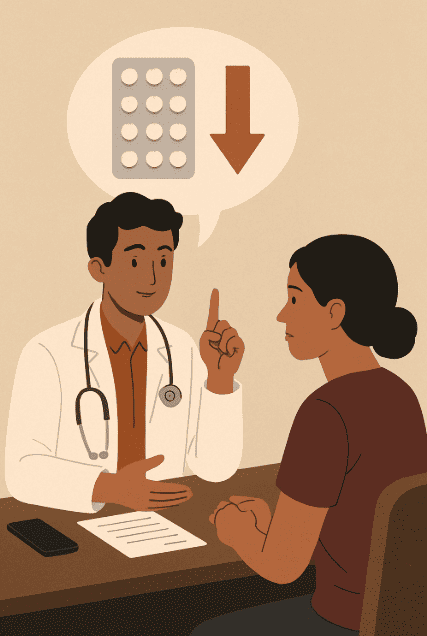How to Stop Antidepressants Safely: Evidence-Based Tips for a Smooth Transition
 Introduction: Stopping Isn’t Just About Stopping
Introduction: Stopping Isn’t Just About Stopping
Many people wonder how to safely stop antidepressants. The internet offers conflicting advice: some urge extremely slow tapers, others say it’s easy. So, what does the science really say?
Recent research, including the 2025 JAMA Psychiatry meta-analysis of 18,000 patients, provides guidance. While withdrawal symptoms are real, they are typically mild and short-lived with proper planning.
Here’s how to approach stopping antidepressants in a safe, confident, and structured way.
Why You Should Never Stop Abruptly (Except on Medical Advice)
Stopping suddenly can lead to:
-
Dizziness
-
Nausea
-
Mood swings
-
Sleep disturbances
Even though these symptoms are often minor, abrupt cessation can sometimes blur the lines between withdrawal and relapse. A gradual reduction is almost always safer.
How to Stop Safely: Key Steps
1️⃣ Consult Your Psychiatrist First
Never make the decision alone. A trained psychiatrist can help assess:
-
Whether this is the right time.
-
Risks of relapse.
-
The safest method tailored to you.
2️⃣ Consider a Gradual Taper
Gradual reduction helps your body adjust. A 2-6 week taper is common, but slower approaches may be used for medications like venlafaxine or paroxetine.
Tapering can be adjusted based on:
-
Previous withdrawal experiences.
-
Duration of use.
-
Type of antidepressant.
3️⃣ Monitor for Symptoms vs. Relapse
Symptoms like dizziness or nausea typically occur within 1-2 weeks and improve.
Relapse signs involve low mood, hopelessness, poor motivation and emerge over weeks to months.
Common Mistakes to Avoid
| Mistake | Better Approach |
|---|---|
| Stopping suddenly on your own | Plan a taper with professional guidance. |
| Mislabeling relapse as withdrawal | Clarify the difference with your psychiatrist. |
| Being over-fearful due to forums | Trust evidence, not anecdotes alone. |
Why Tapering Is Not One-Size-Fits-All
Some people tolerate faster reductions. Others need more caution. Factors include:
-
Type of antidepressant
-
Personal sensitivity to changes
-
History of previous discontinuation attempts
For example:
✅ Venlafaxine and desvenlafaxine need slower, structured tapers.
✅ Escitalopram and vortioxetine are usually easier to taper.
Final Thoughts
Tapering antidepressants is a clinical process, not a personal experiment. With guidance, most people can stop safely without significant discomfort.
The most important takeaway?
Make the decision together with your doctor.
About Dr. Srinivas Rajkumar T
As a Consultant Psychiatrist, I specialize in helping individuals safely reduce and discontinue psychiatric medications through evidence-based deprescribing protocols. I focus on clear, personalized guidance to ensure mental health stability during the process.
I also provide treatment for depression, anxiety, OCD, ADHD, addiction, and dementia care.
If you’re considering tapering antidepressants and want expert support, I’m here to help.
📍 Apollo Clinics Velachery & Tambaram
📞 +91 85951 55808
💻 Online Consultations Available